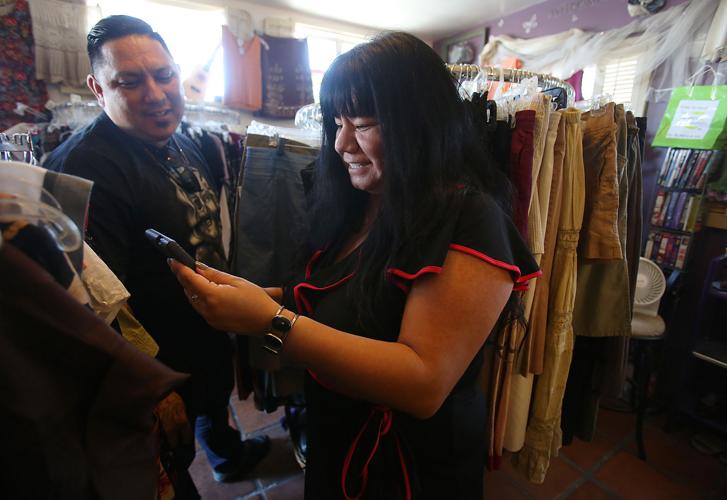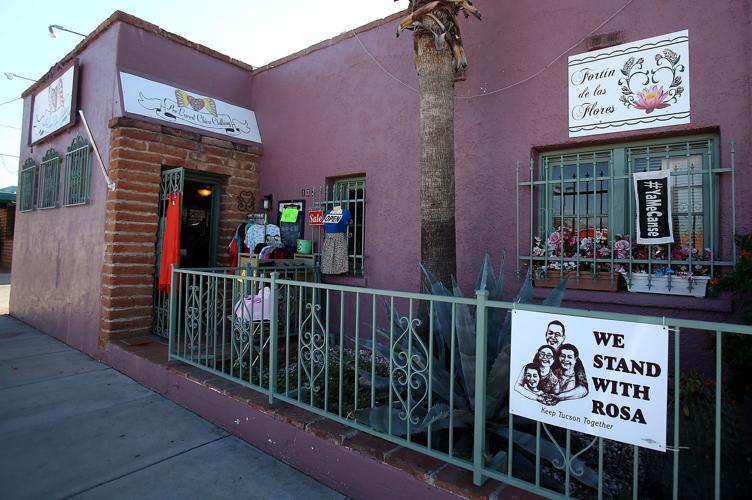Maritza Broce checks the price tags on a jumble of clothes resting on a glass countertop. A twisting line of butterfly decorations climbs a wall behind her as she jots down prices on a green receipt pad, her hands illuminated by a rose-tinged chandelier lamp.
The total is less than $20.
The woman on the other side of the counter smiles, says a warm goodbye and walks out of the store empty-handed. That is until she sees a $2 pair of leaf-colored shoes on the sales rack outside Preloved Chica Clothing and marches back through the door to add to her layaway items.
“She said she didn’t have money, but she needed an outfit so I said, ‘OK — I can work with that,’” Broce says.
Such interactions are not rare occurrences at this South Tucson store, owned and operated by Broce at 102 E. 31st St., just south of East 29th Street.
Preloved Chica Clothing has a two-way relationship with its customers. The community donates items, and all profits go into Fortín de las Flores, a social-service organization that helps women in South Tucson by providing access to affordable clothes, workshops on healthy living and free English classes.
The idea for the store was conceived after the 2008 financial market crash when Broce realized she needed out of the nonprofit world.
“I think all of us just shared a frustration at just the grant model, the nonprofit grant model because if you lose that grant, or that grant decides they want to shift the focus, you’re beholden,” Broce says.
So Broce decided to forgo nonprofits status — at least for now — and worked with others to develop a product-based sales model that allows the store and organization to be financially self-reliant and able to change its focus based on the needs of the community.
The store opened in 2011 with the goal of providing gently used business attire to women re-entering the workforce. Over time, the mission expanded as Broce received feedback from the community.
“She sacrifices her time, her money, everything,” said Veronica Antonio, who along with Lorena Howard, Leatanya Koppa and Rosalva Fuentes co-founded the store. “It was a total, complete personal investment.”
Broce and Antonio have known each other since college, and Antonio offers natural medicine and health workshops out of the store’s community space.
Four years later, the store overflows with color — mirrors and windows bounce light off the purple and yellow walls and onto lacy vests. Winter sweaters, children’s toys and knickknacks are situated from floor to ceiling. Every inch of the store is used.
In the first room, a maze of dresses and blouses leads you the counter where Broice stands in cherry-red platform heels. She needs the extra height, she says, to remind her to hang items up high.
While clothing is the main source of income for the store and organization, the founders decided more than two years ago to also focus on healthy living.
“You see all these stores with organic stuff, but they’re never in the south-side area,” Antonio says. The closest natural food grocer is more than three miles away, and it’s not easily accessible for a community that relies on public transportation, walking and bicycling, Antonio says.
Beyond food and beauty products, Broce believes in a holistic approach to health. In July, Jessica Citlalcoatl opened Tierra Sagrada Massage Therapy in a cozy room in the back of the store. She offers massage on a sliding scale.
Citlalcoatl is a member of Muxeres Sin Fronteras (Women without Borders), a collective that holds a low-cost massage clinic on the first Saturday of each month. The community room is transformed with curtain dividers, massage tables and chairs and an area for acupuncture and reiki treatments. A 45-minute session is $15, but no one is turned away due to lack of funds.
Services like massage therapy are often too expensive and far away for the majority of residents in South Tucson.
“You’re not going to the north side or the east side,” says Luissa Castro, a volunteer and customer at the store. “I felt so privileged because I never had a massage, ever.”
Castro first came to the store to buy a new work outfit and now considers Broce a friend. She volunteered for the first time in her life at the store’s International Women’s Day block party, which is held each March.
Women who contribute to the community are recognized, people donate food, and community organizations have tables at the event. Activities like the party promote community involvement, Broce says.
This year, Grace Beltran received an award for her contributions as a teacher and for planning a neighborhood watch. On Friday, she and her husband, Ed Beltran, were to have a show featuring their artwork in the store’s new gallery space.
“She is just like this rare jewel who is really going to change lives I think and brings out the best in people,” Antonio says about Broce. “She became the go-to girl because she listened to what the community needed.”







